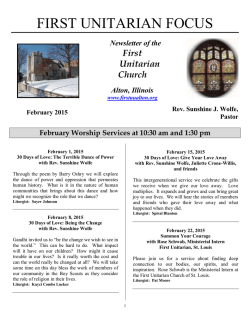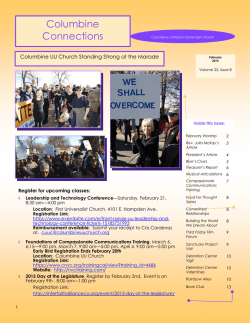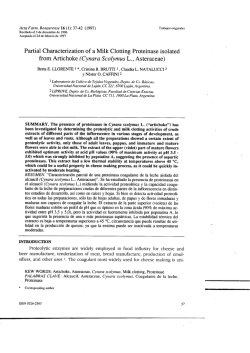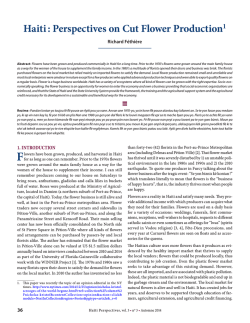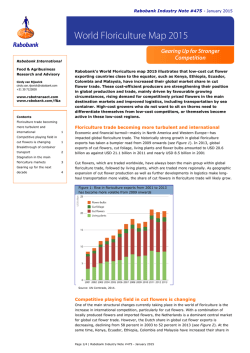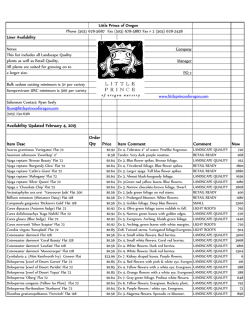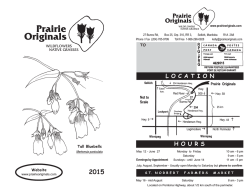
military ministry toolkit - First Unitarian Universalist Church of San
VOL. 9,
NO. 2
February, 2015
FirstWords
A publication of the First Unitarian Universalist Church of San Diego
MILITARY MINISTRY TOOLKIT
BY NANCY FISK
Last fall, an invited group
at First Church field tested
a new UUA curriculum
called the Military
Ministry Toolkit. Of those
who were invited, one
was active duty military,
two were military spouses, and
several had no military affiliation.
Jaynelle Miller is a military spouse and a member of First
Church who participated in the class. During the class,
she had some surprising insights. The members were first
asked what their childhood impressions of the military
were. Jaynelle was surprised to discover that she had no
exposure to the military as a child. When her husband,
Justin Miller, joined the Navy, the two of them were free
to create their own version of what it meant to be a
military family.
This was important because the
military are often seen as being
very traditional and conservative.
Only 5% of those in the military
have a bachelor’s degree.
Jaynelle has her bachelor’s in
Psychology, while Justin has a
Master’s in Political Science.
Because they move around so
much, military families need a
place wherever they are
stationed that gives them a sense of belonging. Since
the Millers discovered the Unitarian Universalist faith, the
UU churches near where they are based have become
their spiritual home.
Later in the class, the group members were led in a
discussion about the differences between a just war
theory, pacifism and peacemaking. Peacemaking
encourages peaceful solutions to conflict, following all
options, including diplomatic negotiations, before the
necessity of war is considered.
Jaynelle saw the course as having a great benefit
towards facilitating a conversation that encourages the
airing of feelings regarding those in military service,
veterans and their families.
The group gathered for the field testing was very promilitary. Jaynelle can see the benefit of hearing from
those who have negative reactions to the military. And
she sees it as a very necessary curriculum in those cities
and hubs where there is a large military presence.
There will be a new Military Ministry Toolkit class, starting
on Thursday, Feb 12. The class is 6 sessions on Thursdays in
February and March, facilitated by Rev. Kathleen
Owens, and Rev. Jennifer Channin. Registration is
required for the class but it is open to everyone, with or
without military affiliation.
The class will consider questions such as:
Is our congregation reaching out to active duty
military personnel, veterans and their families?
Do we want to make a safe, welcoming space in
our community for sharing members’ stories of
involvement in war or military life?
Does our community seek to become more
intentionally open and inviting to military service
people, veterans, and their families?
How do we support families who have someone
serving in the military?
How can we be welcoming to military personnel
who are discovering Unitarian Universalism and are
attending First Church?
How can we invite stories of veterans and their
families into congregational life?
How can we hold honest and faithful conversations
about war and peace that make room for multiple
perspectives, experiences, and truths?
For more information on how to register for this class, go
to the website under Adult Education or follow this link
http://www.firstuusandiego.org/adult-religiouseducation-class-registration.
Also in this issue:
Building Partnerships, Rev Kathleen Owens Pg 2
February’s Sermon Messages Pg 2
Ritual, Place, and Belonging Pg 3
Say It With Flowers Pg 4
Hashtags in Social Media Pg 5
Joan Cudhea and the Clara Barton Sisterhood Award Pg 6
Lorelei Isidro, South Bay Music Coordinator Pg 7
FirstWords 2
Building Partnerships
BY REV KATHLEEN OWENS, LEAD MINISTER
February is Black History Month and our worship
theme this month is Love. With this important
combination, I'm excited about the many
directions our worship services, Wisdom Circles,
and Deep Conversations will go. There is so
much that is 'up' for our country around the
issue of race—from the protests against police
brutality, especially to young men of color, to
the Black Lives Matter demonstrations, to
immigration reform and the growing economic
inequality that severely impacts people of
color. All of these issues and more cry out for
people of faith to be a voice for justice and
moral action.
By working with and continuing to build
partnerships with others, our UU faith can be a
stronger voice in San Diego. There are times
when it can be hard to discern which groups
reflect the values that we can work with and
which groups have an agenda that we cannot
support. Sometimes the need for this
knowledge can slow down our response; so
the ministers, staff and lay leaders are working
on some guidelines to help us be more flexible
and timely in our response to current events.
Because this work requires some
uncomfortable conversations, we all have to
remember to speak the truth in love, to honor
each person's worth and dignity and
experience, and act respectfully in all ways.
In the near future, there will be new programs
to help us in this work. I'm very excited that the
Rev. Ian Riddell will join the ministerial team at
First Church in August to help create worship
services that stretch and encourage us. He will
lead and deepen the music program and also
provide pastoral care, teach adult religious
education classes, and be a specific support
to the UU Men's Fellowship.
All of this—the programs, worship services and
more—is grounded in Love. Though the
programs and services will continue long after
February, love, our Universalist heritage, will
guide us always. For we are a tradition that
Stands on the Side of Love.
Faithfully yours,
February, 2015
FebruarySermonMessages
Celebration Times:
Hillcrest Campus: Sunday, 9:30a and 11:30a
(ASL Interpretation)
South Bay Campus: Sunday, 9:30a
(Intergenerational, Bi-lingual [Spanish,
English])
The February Transformational Theme is Love
Sunday, February 1:
Hillcrest Services—
"Love in the 21st Century,"
Rev Kathleen Owens, Lead Minister.
South Bay Service—
"Love with the Proper Stranger,” Adam
Dyer, Intern.
Sunday, February 8:
Hillcrest Services—
"To Speak With Bravest Fire,"
Rev Jennifer Channin, Assistant
Minister.
South Bay Service—
"Exploring the Koran,"
Rev Kathleen Owens, Lead Minister.
Sunday, February 15:
Hillcrest Services— ROAR with Soul/Journey
Toward Wholeness Sunday
“Full Spectrum…Full Circle: Handing
The Baton to the Next Generation.”
Adam Dyer, Intern Minister.
South Bay Multigenerational, Standing on the
Side of Love Service—
"Trans*forming Love,"
Dr Melissa James, Dir of Children and
Family Ministry.
Sunday, February 22:
Hillcrest Services—
"Hand and Heart—UU and Islam,"
Rev Kathleen Owens, Lead Minister.
South Bay Service—
"To Speak With Bravest Fire,"
Rev Jennifer Channin, Assistant
Minister.
February, 2015
FirstWords 3
RITUAL, PLACE, AND BELONGING
BY DR. MELISSA JAMES, DIRECTOR OF CHILDREN AND FAMILY MINISTRY
Throughout my years as a religious scholar and
educator I have visited many places of worship. I
have delighted in the welcome I have felt as
communities allowed me to bear witness to the
rituals, words, and music that gave them life.
Recently, I joined an evening service that began
with reflection and meditation and moved into
song and ritual. I was happy to be there and felt
welcomed, but held onto a sense that the
unfamiliar kept me at a distance. This didn’t bother
me. I was not there seeking
connection to the community or
my own spiritual renewal. Then
something changed—the group
moved into a ritual blessing of
bread that used prayers which
were familiar to me. Without
even trying, the group had
welcomed me into their
community in an important way.
At South Bay, children are
regularly involved in the full
service including rituals, songs,
stories, and teachings. As they
have grown, these children have developed a
sense of belonging and family amidst community.
At Hillcrest, we also have a history of having
children among us in worship. This is incredibly
important, as it reminds all of us that we are more
fully in community when people of all ages are
connected. It is also important in the spiritual
formation of children and families, as ritual and
worship together creates foundational
experiences, in which children gain tools for
making sense of their world through religious and
spiritual practices.
A part of the children’s experience at Hillcrest
involves circling around the chalice and reciting
the affirmation (the one we call the “Children’s
Affirmation” at Hillcrest). This ritual centers on a key
symbol for UUs as a community—the chalice. This
same chalice is kindled each service as we recite
the Church Aspiration and is extinguished when
one among us dies.
To gather around the chalice puts the focus of the
ritual on the circle that is our community, tied
together by a common quest. We aim to strike the
balance between creating a sense of belonging
and place and fostering a sense of awe and
wonder. By proclaiming our affirmation in both
Spanish and English, we broaden that invitation to
belonging and place. Saying the affirmation in
Spanish becomes a way for many to enter into the
ritual more fully, through using a language that is
central to who they are. For
others, this addition allows
them to engage with the ritual
by pushing them to learn
something new.
When we began introducing
the affirmation to the children
in Spanish, I wondered how
they would respond. I
wondered if there would be a
chorus of “why do we need to
do this?” or “I don’t want to.” I
was prepared for these
reactions, but they didn’t
come. Instead, I heard responses like, “We speak
Spanish at home,” and “I went to a Spanish
immersion school.” Their responses were a reminder
to me of why we add the Spanish at Hillcrest—
because our world, our context, our community is
interconnected by many things, including
language. This change was not about a nod to
diversity in worship; it was about opening up and
expanding our ritual to enter into deeper meaning
together.
For those of you for whom the affirmation in both
English and Spanish is comfortable, I invite you to
follow our children in our affirmation boldly. For
those of you for whom the affirmation is familiar in
just one language, I invite you to practice with the
children until you, too, can speak our affirmation
boldly in both languages.
Somos Uniarios Universalistas
Personas de mentes abiertas
Corazonez amorosos
Y manos que dan la bienvenida
FirstWords 4
February, 2015
SAY IT WITH FLOWERS
BY HAROLD M. BERGSMA
When I traveled to Hawaii, upon
arrival, a beautiful woman
draped a lei (garland) of flowers
around my neck. What was she
saying to me? Why use flowers in this way?
Different flowers used for the lei have different
meanings and there are prohibitions as well.
Ancient peoples in Hawaii used strings of flowers in
religious ceremonies.
Flowers were
widely used in the
Sikh Gurudwara
that I visited in
Amritsar and other
places in India. I
asked a Sikh man
why flowers were
used in worship and he had a simple answer, “I
offer flowers with a sense of devotion to God, then
God is gratified. Then I feel that gratification in my
life. It is a part of my puja.” (Puja can be translated
as worship.)
Did you ever notice the flowers
displayed on the stage in front of
the pulpit on Sunday? Did you
wonder why were they there? Are
you familiar with the symbolism
related to the individual types of
flowers? How did that symbolism
relate to “worship,”, or should it?
How many different types of flowers did you
notice? Did one or two of the flowers symbolize
fertility? What does the rose symbolize?
Some
have called it the “flower of god” and
that it relates to messianic restoration.
A lotus flower has very special religious
meanings to many people, including
some Buddhists who see in it spiritual
growth, spontaneous birth, purity
and the power of creation. In
Hinduism, puja can actually be
translated as the “flower act”. The
lotus is but one among many
flowers used in puja and is central in
meditational devotion among Buddhists as well.
I can only hint at the meanings
flowers have played in various
religions. Why does the “White
Madonna Lily” feature in religious
weddings? Taoists use flowers to
symbolize life, happiness, and
fertility, and white flowers are
symbolic of death at funerals. The
Chinese use flowers in weddings to
symbolize renewal of life and
fertility with the color red --deep
and powerful blood red.
The use of flowers in various
religions is a most interesting topic
to research, and there are surprises which include
prohibitions, such as in Judaism flowers are not
used in funeral observances, but are widely used
during weddings. Take a little walk to the front of
the meeting hall next Sunday and
identify types of flowers and then
go home and research what each
one has meant to Unitarian
Universalists throughout their
fascinating history.
In worship, say it with flowers.
February, 2015
FirstWords 5
HASHTAGS IN SOCIAL MEDIA
BY KATH HILLERY
Perhaps you’ve seen or heard the rallying cry “Je
Suis Charlie” (I am Charlie) used by supporters of
free speech and the victims of the Charlie Hedbo
murders. This slogan is reminiscent of John F.
Kennedy’s "Ich bin ein Berliner" ("I am a Berliner")
spoken in West Berlin on the 15th anniversary of the
Berlin blockade, and French reporter Nicole
Bacharan’s declaration “Tonight, we are all
Americans,” ("Ce soir, nous sommes tous
Américains") expressed on the evening of
September 11, 2001. Shortly after the attacks in
Paris this last month, millions of people expressed
their support on Facebook, Twitter and Instagram
for those affected by the attacks by using a special
symbol in their messages, #JeSuisCharlie, to label
their comments so that others all over the world
could easily find them.
The hashtag, which you already know as the
pound symbol, #, is used on many social media
websites to “tag”, or label, topics and facilitate
searches for related material. The term “hashtag” is
now so popular that the Oxford English dictionary
added it to their 2014 edition. Text that is preceded
by a hashtag becomes a hyperlink (special text
that directs the computer to another document or
webpage) that can be clicked to reveal postings
that have the same hashtag. It’s also possible to
search for a hashtag in a search engine such as
Google, Yahoo or Bing.
The hashtag, #JeSuisCharlie, quickly became the
way to communicate with others about what was
happening in France. According to Wikipedia,
“Within two days of the attack, the slogan had
become one of the most popular news hashtags in
Twitter history. Je suis Charlie was embraced
worldwide, was used in music, displayed in print
and animated cartoons (including The Simpsons),
and became the new name of a town square in
France.”
Creating a hashtag is fairly simple. All that is
required is the # symbol followed by letters or
numbers. Spaces and special characters like @
and & are not allowed. Uppercase letters are
equivalent to lower case letters in a hashtag, so in
lieu of spaces, words can be separated using
uppercase letters.
Clever use of hashtags can allow you to express a
wide range of emotion or humor. Sarcasm can be
conveyed using hashtags, as shown in this cartoon:
Because hashtags are hyperlinks, directing the
computer to other websites, they are frequently
used for advertising and promotion. This tweet
contains an example of multiple hashtags, to
express a lot in very few words.
The movie #Gravity is beautiful, but so terrifying!
#NeverGoingToSpace
While multiple tags can be included in a message,
hashtags should be used sparingly. No more than
three hashtags should be included in a single
Tweet. Because Tweets are limited to 140
characters, limiting the number of hashtags allows
you characters to devote to your tweet.
Now that you know about hashtags, why don’t you
give one a try? Open a search engine like Google,
Yahoo, or Bing and type in #UUA. You’ll be taken to
the UUA Twitter page, a webpage designed to
promote UUA values and show who Unitarian
Universalists are in a whole new way. You can read
thoughts from UU’s all over the world, and learn
more about what’s happening in the UU faith.
That’s a whole lot of excitement for four little
FirstWords 4
February, 2015
JOAN CUDHEA AND THE CLARA BARTON SISTERHOOD AWARD
BY DOROTHY PEARLMAN
The Clara Barton Sisterhood award
was created by the UU Women’s
Federation as a way to honor
those women who have
contributed to the UU faith and
their communities and who are 80
Clara Barton,
years old. Recently, Joan Cudhea
founder of the
was nominated by the local UU
American Red
Cross
Women’s Federation chapter and
was accepted for the Clara Barton Sisterhood life
membership. We honor Joan for her life-long
contributions to our cherished faith, her energetic
willingness to contribute her gifts to benefit our
church and wider communities while setting an
example worthy of emulation by her fellow UUs.
In San Diego, she joined First
Church and volunteered on
the Membership and Book
Room committees. She became a Certified
Financial Planner in private practice and served as
chair of the Finance and Planned Giving
Committees for the church. Joan was elected to
the Board of Trustees, and served as Church
Secretary, and Church Treasurer. She frequently
attended General Assembly (GA) as a delegate,
bringing back her interest in Association programs
and introducing them to our congregation. These
programs included Journey Toward Wholeness and
Mind the Gap, which led to our Young Adult
Ministry.
Growing up in Marblehead, Massachusetts, Joan
attended the Universalist church in Lynn,
Massachusetts. As a teen she belonged to AUY
(American Unitarian Youth) serving on its district
and continental Boards. She later graduated from
Wellesley College and married.
Joan was appointed to the
President's Council under UUA
Presidents Buehrens and
Sinkford. Her expertise in
financial planning and concerns
for the environment and social
justice led her to serve on the
UUA's Committee on Socially
Responsible Investing, where she
guided Association investments into entities in line
with UU values. After two 3-year terms, she was
appointed to serve on the West Regional
Subcommittee on Candidacy of the UUA
Ministerial Fellowship Committee (MFC) which
interviews ministerial aspirants and evaluates their
fitness to serve as UU ministers. After 6 years on the
MFC, she was appointed to the Starr King School
for the Ministry's Board of Trustees, serving until 2014.
As a young wife and mother,
Joan joined the UU church in Long
Beach, California, where she was
active in the first grade religious
education (RE) program. She
returned to Massachusetts and co
-founded the UU Fellowship in
Ipswich, growing the children's
religious education program from
3 to 30 children. She attended
summer sessions at the Unitarian camp on Star
Island and the Universalist Ferry Beach camps to
enrich the Fellowship's RE programs. Maintaining
her strong New England roots, she still visits her
family-owned summer home, on the shore of a
pond in Massachusetts, surrounded by 68 acres of
woodland placed under conservation restriction.
In the 1970's, Joan returned to California via San
Francisco, joining the First Unitarian
Universalist Society. She earned a Master's
degree at San Francisco State University
and worked as a report writer and
educator in the environmental
awareness community, before moving to
San Diego a few years later.
Joan continues her participation in many churchrelated and community activities. She is a member
of Friends of Jung, the League of Women Voters,
and a docent at the Japanese Friendship Garden
in Balboa Park. She and her life partner, Tomas Firle,
frequently travel for pleasure and work to create a
more peaceful world. She’s a “GA Junkie,” rarely
missing this annual UUA event. She
continues to serve our congregation in
various programs in the Larger UU
Connections and Social Justice
Ministries.
February, 2015
FirstWords 5
LORELEI ISIDRO, SOUTH BAY MUSIC COORDINATOR FOR FIRST CHURCH
BY NANCY FISK
Lorelei (pronounced: Lor-e
-lay) Isidro has been
serving as the South Bay
Music Coordinator for First
Church since September
2014. Lorelei first came to
First Church after
researching churches
online. She arrived at First
Church on a Jazz Sunday
that was led by Dana
Decker. Impressed with
the music, she approached Dana and volunteered
to sing as a soloist. After working with Dana for
several months, he recommended her for the job
of music coordinator at South Bay when the
position became available.
Working part-time for First Church, Lorelei
coordinates the musicians who perform at the
South Bay service each Sunday. She also
researches what would make appropriate introit
and postlude music for the service. On a recent
Sunday, Lorelei played the ukulele and led the
hymns for the congregation, accompanied by
Chase Pado on the piano and Chris Duvall on the
bass. Other groups that have performed in South
Bay are the JUUL Tones and a trio of handbell
players.
Born in Hawaii, Lorelei attended part of primary
school at Sullivan Elementary in Yokosuka, Japan
and studied voice at Valhalla High School, in
Rancho San Diego. Music has been a constant in
her life. She started piano lessons at 9, took singing
lessons at 18, and went to Grossmont College and
San Diego State University as a voice
performance major. She has played as an
organist at church, composed music for herself,
produced a children’s album and taught music
classes ranging from mommy and me toddler
classes, private piano lessons to conducting
church choirs and children's choirs. Locally, she
has sung jazz vocals with John Garner, a jazz
guitarist. She also has a 5 member band called
the Fish and the Sparrow.
She worked at a business called Music for Kids for
13 years in Rancho Bernardo. After that she had
her own business, known as Music Tots, for 5 years.
At present, she teaches music in Del Sur for
kindergarten through 5th grade.
Lorelei has two children, a 12 year old daughter,
Faye, and a 10 year old son, Royce. When not
performing or teaching music, Lorelei likes to ride
her bike, go hiking, draw and do arts and crafts.
The beliefs that Lorelei enjoys about Unitarian
Universalism is that the important thing is to be
compassionate and nurture individuals to grow to
be more spiritual.
Lorelei is reviving the South Bay Singers group, with
a performance scheduled for Easter Sunday, April
5, in South Bay. The music will be fun and fairly
easy. If you are interested in joining the South Bay
Singers, email Lorelei at [email protected]. She
will then send links to the music you need to
practice and mp3 recordings to listen to.
Rehearsals will begin after the service on Sunday,
Feb 22.
FirstWords 6
February, 2015
Staff
Rev. Kathleen Owens, Lead Minister
Rev. Jennifer Channin, Assistant Minister
Adam Dyer, Intern Minister
Rev. Jim Grant, Affiliate Minister
Robie Evans, Director of Operations
Dr. Melissa James, Director of Children and Family Ministry
Daniel Ratelle, Hillcrest Music Coordinator/Adult Choir Director
Lynn Mendoza-Khan, Youth and Children’s Choir Director
Lorelei Isidro, South Bay Music Coordinator
Andrea Newall, JUUL Tones Ensemble Director
Roy Attridge, Handbell Ensembles Director
Justin Murphy-Mancini, Organist and Pianist
Kristen Kuriga, Social Justice/South Bay Ministry Teams Coord.
Suzette Southfox, Director of Membership and Development
Alice King, Young Adult and Campus Ministry Coordinator
Abby Koch, Executive Administrator and Office Manager
Käthe Larick, Youth Programs Coordinator
Chris Christenson, Communications, Database, Adult Ed. Coord.
Jenny Epler, Events Scheduler
Connie Hayes, Bookkeeping Controller
Rev. Dr. Carolyn and Rev. Dr. Tom Owen-Towle, Ministers Emeriti
Board of Trustees
Tony Brumfield, President
Claudia Lizett Lopez, Vice President
Louise Kilnke, Treasurer
Kath Hillery, Secretary
Mike Moreau, Immediate Past President
Michanne Hoctor-Thompson, Dave Karpinski, Marcia Biller, John
Keasler, Carolyn Woodbury.
ONLINE E-mail & Web Addresses
FirstWords Editor & Submissions, Nancy Fisk:
[email protected]
To be added to the E-mail List:
[email protected]
Facilities (request for maintenance):
[email protected]
General First Church E-mail: [email protected]
Scheduling of Church Property Requests:
[email protected]
Order of Service submissions: [email protected]
The Window submissions (Church bulletin):
[email protected]
Webmaster: [email protected]
Care Network: [email protected]
First Church Web Sites:
Main Website: http://www.firstuusandiego.org
South Bay Campus:
http://www.firstuusandiego.org/uus-of-the-south-bay
To view sermon video casts, click on
these YouTube or Vimeo buttons:
Giving: http://www.firstuusandiego.org/giving-overview
Click on these Amazon Affiliate or iGive buttons for your
online shopping and First Church receives a portion of
the sales. Secure and private.
First Unitarian Universalist Church of San Diego
4190 Front Street (GPS use 298 West Arbor Drive)
San Diego, CA 92103-2098
Phone: 619-298-9978
Fax: 619-298-9997
E-mail: [email protected]
POSTMASTER: Send address changes to FirstWords,
4190 Front Street, San Diego, CA, 92103.
© Copyright 2026

